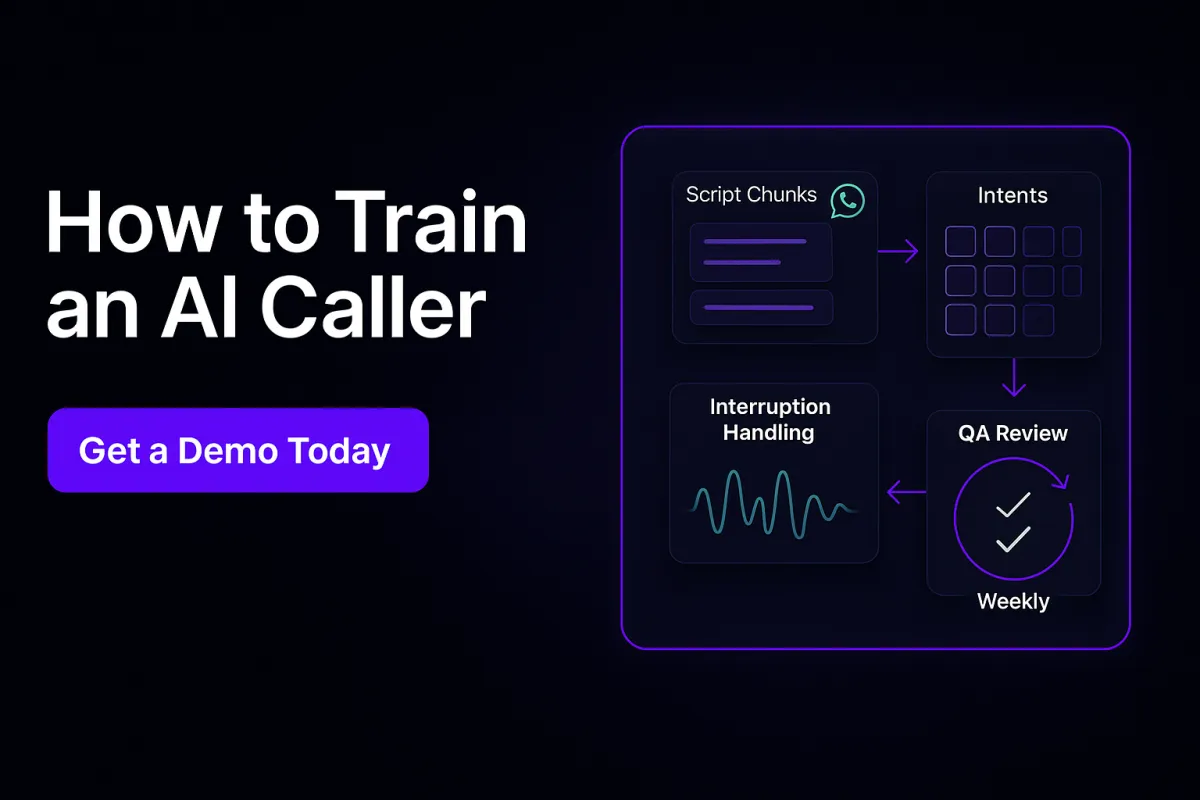
How to Train an AI Caller
How to Train an AI Caller
Script chunks, intents, interruptions, and QA review cycles that improve weekly.
Most “voice bots” fail for the same reason: scripts are brittle, intents are vague, and nobody reviews conversations against business goals. Training an AI caller is less about teaching lines and more about orchestrating behavior—what to say, when to switch gears, and how to hand off with context. Here’s the playbook we deploy across AI Callers and the AI Receptionist so performance improves every single week.
1) Start with script chunks, not monologues
Think in tiny, reusable blocks the model can assemble on the fly:
Openers by source: form lead, missed call, WhatsApp reply.
Two-option prompts: “Quick price range now, or book a 10-min slot?”
Micro-disclaimers (POPIA §18): purpose + minimal data line, kept short.
Closers: recap + next step + “I’ll WhatsApp the details.”
Each chunk has a goal and allowed actions (book, request docs, send link). We store the latest versions centrally in InOne CRM so updates roll out consistently across teams.
Interesting AI fact: Fewer, clearer chunks beat long scripts. Short prompts reduce latency and cut error chains, especially when callers get interrupted.
2) Build a tight intent library
Your caller shouldn’t guess. Define 10–20 intents that cover 90% of your traffic:
Sales: book demo, pricing range, product fit, callback later
Service: book service, reschedule, order status, directions
Admin: documents/KYC, billing question, cancel, speak to human
Each intent includes: slotting rules, allowed actions, fallback, and a WhatsApp follow-up template from your WhatsApp hub (opt-out ready; see FAQ).
3) Treat interruptions as normal (because they are)
Humans cut in. Train the caller to listen for cues and shift gears gracefully:
Busy now → WhatsApp: “No problem—I’ll send three times on WhatsApp; tap the one that suits.”
Change of topic: detect new intent (“trade-in” after “test drive”) and confirm switch in one line.
Emotion/urgency: escalate to a person when frustration or “today/urgent” cues appear; pass a context packet to the Unified Inbox in InOne CRM.
Tie every “I’m busy” or “call me later” to a channel-safe follow-up (approved template) so the conversation continues without starting over.
4) Qualification without the checklist feel
Use conversational BANT prompts that progress the call:
Need: “Are you after a quick diagnostic or the full install?”
Timing: “Is this week workable, or should we look at early next?”
Authority: “Should I loop in anyone else on the WhatsApp summary?”
Budget (soft): “Most teams pick Starter, Pro, or Managed—want the best fit?”
Those taps and answers become structured fields in InOne CRM so routing and reporting stay honest.
5) Close the loop in WhatsApp (where actions finish)
Voice is great for agreement; WhatsApp is perfect for action. After the call, send a card with:
Confirmed time (+ .ics) and map/directions
Prep checklist (what to bring, docs, photos)
Pay/approve buttons when relevant
Start many of these threads straight from your site using WhatsApp Website Integration so UTM and page context follow into the record.
6) Weekly QA that actually moves metrics
Skip “spot-check a few calls.” Run a tight loop:
Pull a small, honest sample (by intent & campaign).
Score three things: outcome (book/quote/pay), tone fit, and correct escalation.
Promote the best human/AI lines into your script-chunk library.
Ship one improvement per intent—don’t boil the ocean.
Track this in Reporting & Analytics: call→meeting rate, show-rate after T-24/T-2 nudges, and revenue per conversation. If a number dips, update chunks or fallbacks—not just the model.
7) Guardrails for brand + compliance (South Africa-ready)
POPIA by design: short purpose line; minimal data; consent timestamps stored to the contact.
Recording rules: disclose and log recording status where enabled; switch to WhatsApp if refused.
Action whitelist: callers may book, share ranges, send directions/links, or request docs—nothing off-policy.
Fail-safes: low confidence → one clarifier or warm transfer (the last 5–10 turns and intent confidence land with the agent).
Quick start checklist
Publish your script-chunk library in InOne CRM
Define 10–20 intents with actions + fallbacks
Enable WhatsApp confirmations + payments via your WhatsApp hub
Add a site launcher with WhatsApp Website Integration
Review 20 calls weekly; promote winning lines; retire weak ones
Useful links:
AI Callers: https://aiautomatedsolutions.co.za/ai-callers
AI Receptionist: https://aiautomatedsolutions.co.za/ai-receptionist
InOne CRM: https://aiautomatedsolutions.co.za/inone-crm
WhatsApp solutions: https://aiautomatedsolutions.co.za/whatsapp
WhatsApp Website Integration: https://aiautomatedsolutions.co.za/whatsapp-website
FAQ (templates & POPIA): https://aiautomatedsolutions.co.za/faq
Homepage: https://aiautomatedsolutions.co.za/
Contact us: https://aiautomatedsolutions.co.za/contact-us


